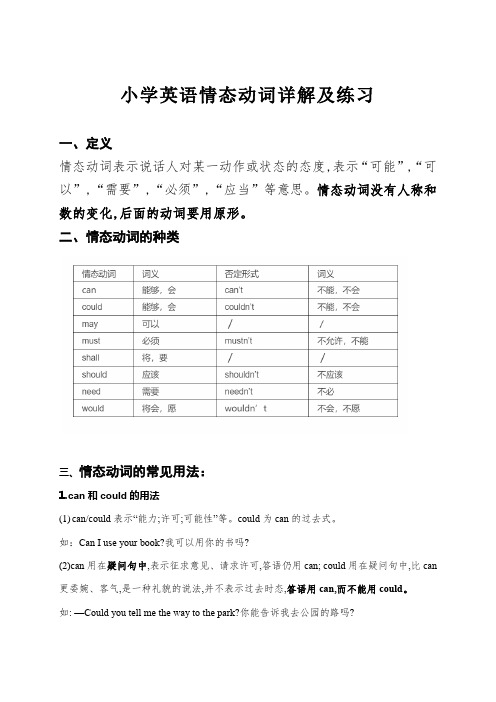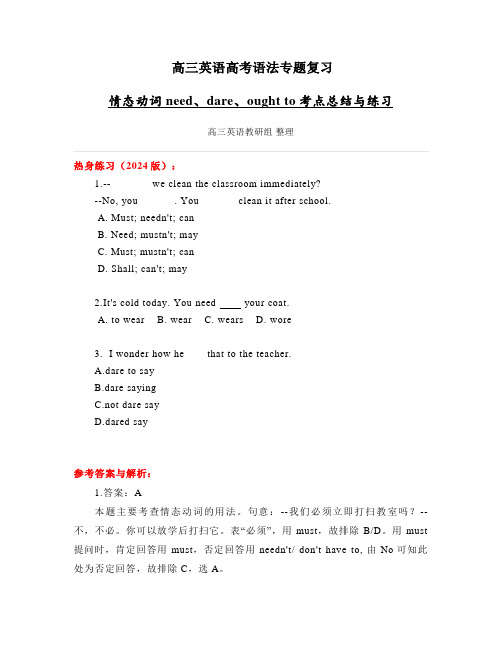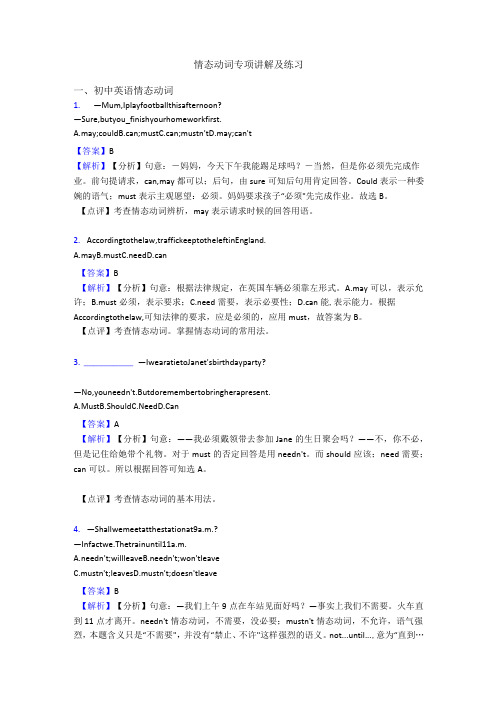情态动词讲义及练习
小学英语情态动词知识点及练习

情态动词【知识要点】:情态动词(Modal verbs)本身有一定的词义, 表示语气的单词。
但是不能独立作谓语, 只能和动词原形一起构成谓语。
情态动词用在行为动词前, 表示说话人对这一动作或状态的看法或主观设想。
情态动词虽然数量不多, 但用途广泛, 主要有下列: can (could), may (might), must, need, ought to, dare (dared), shall (should), will (would) must not.情态动词无人称和数的变化, 情态动词后面跟的动词须用原形, 否定式构成是在情态动词后面加 "not"。
疑问形式是将情态动词提至主语前。
个别情态动词有现在式和过去式两种形式, 过去式用来表达更加客气, 委婉的语气, 时态性不强, 可用于过去, 现在或将来。
情态动词属非及物动词, 故没有被动语态。
【典型例题】:【专题一】:can和could的用法【例1】Can you lift this heavy box?(体力)【解析】表示能力(体力、知识、技能)【练习】1.Mary speak three languages.(知识)2... yo.skate?(技能)此时可用be able to代替。
Can只有一般现在时和一般过去式;而be able to 则有更多的时态。
I’ll not be able to come this afternoon.当表示“经过努力才得以做成功某事”时应用be able to,不能用Can。
【例2】-----Can I go now?----.Yes.yo.can..No.yo.can’t.【解析】表示请求和允许。
此时可与may互换。
在疑问句中还可用could,might 代替,不是过去式,只是语气更委婉,不能用于肯定句和答语中。
【练习】---- I come to see you tomorrow?---.Yes.yo.....----No.yo..../I’.afrai.not.【例3】Can this be true?【解析】表示推测(惊讶、怀疑、不相信的态度),用于疑问句、否定句和感叹句中。
小学英语情态动词详解及练习(讲义)通用版英语六年级下册

小学英语情态动词详解及练习一、定义情态动词表示说话人对某一动作或状态的态度,表示“可能”,“可以”,“需要”,“必须”,“应当”等意思。
情态动词没有人称和数的变化,后面的动词要用原形。
二、情态动词的种类三、情态动词的常见用法:1.can和could的用法(1)can/could表示“能力;许可;可能性”等。
could为can的过去式。
如:Can I use your book?我可以用你的书吗?(2)can用在疑问句中,表示征求意见、请求许可,答语仍用can; could用在疑问句中,比can 更委婉、客气,是一种礼貌的说法,并不表示过去时态,答语用can,而不能用could。
如: —Could you tell me the way to the park?你能告诉我去公园的路吗?—Sorry. I can't. I'm new here.不好意思,我不知道。
我是新来的。
[注意]①can和could只能用于现在时和过去时两种时态。
②另外,can't可表示否定推测。
2.may和might的用法may/might意为“可以”,表示同意、许可或请求对方许可,也可表示祝愿。
might是may的过去式,有两种用法:一种表示过去式;一种表示虚拟语气,使语气更加委婉、客气,或表示可能性更小。
以may开头的一般疑问句,其否定回答用mustn't。
如: May I use your book? 我可以用你用的书吗?He might be alive.他可能还活着。
【注意】can和may都可以用来表示请求或允许,但may比can更正式,更客气。
3.must和shouldmust意为“必须,应当”,含有一种命令的语气,比较生硬,不容商量。
否定形式mustn't, 表示“不得”,“一定不要”。
如:You mustn't drive after drinking.你绝不能酒后驾车。
情态动词Can、Could考点总结讲义 高三英语高考语法专题复习

高三英语高考语法专题复习情态动词概述与Can、Could考点总结与练习高三英语教研组整理热身练习(2024版):1.No one __________ be more warm-hearted; he has a heart of gold.2.—Did you visit the famous cultural relics last month?3.I think the work _________ be completed ahead of time.参考答案与解析:1.can/could考查情态动词。
句意:没有人能(比他)更热心,他拥有一颗金子般的心。
“can’t/couldn’t…+比较级”表示最高级含义。
No one本身表示否定,故应填can/could。
2.could have visited考查情态动词。
句意:——上个月你参观了那个著名的文物吗?——没有,我们本能够去,但是我们花太多时间购物。
结合句意可知,此处表示我们“本能够”去的,但是我们花太多时间购物,所以没能去。
could have done 本能够做某事(但没做成)。
故填could have visited。
3.can考查情态动词。
句意:我认为这项工作可以提前完成。
根据句意,此处表示客观上的可能性,应用情态动词can。
故填can。
考点讲解:概述情态动词(Modal Verbs)是用来表示能力、允许、预言、可能性、建议、情感、态度等的含义的一类动词。
我们使用缩写modal v.来表示情态动词。
情态动词属于不完全动词,因此情态动词不能独自在句中作谓语,即其后需要一个实义动词和情态动词共同在句中作谓语。
这样的谓语一般也称作“复合谓语”,属于复合谓语中的一种类型。
一般地,情态动词后面接不带to的动词不定式,即动词原形。
一般地,情态动词具有助动词的语法属性,可以完成一些语法功能的需要(比如可以构成否定句或疑问句等)。
有一些情态动词有相应的过去式的形式,有一些则没有(如must 等)。
情态动词讲解,练习题和答案(最新整理)

一、情态动词主要用来表示说话人的看法、态度等1. can (could)1) 表示能力,could主要指过去时间。
例如:① Two eyes can see more than one. 两只眼比一只眼看得清。
② Could the girl read before she went to school? 这女孩上学前能识字吗?因为can不能和其他助动词连用,所以表示将来式时用will be able to例:You will be able to skate after you have practiced it two or three times.注意:Can表示一贯的能力,be able to表示客观能力和通过努力可以达到的能力I can’t swim. But I am sure I will be able to swim through more practicing.The fire spread through the hotel, but everyone was able to get out2) 表示允许。
例如:① Can I have a look at your new pen? 我可以看一看你的新钢笔吗?② He asked whether he could take the book out of the reading—room. 他问他可不可以把书带出阅览室。
3) 表惊异、怀疑、不相信等态度。
主要用于否定句、疑问句或感叹句中。
例如:① Where can (could) they have gone to? 他们会去哪儿了呢?② How can you be so careless? 你怎么这么粗心?4) 比较委婉客气地提出问题或陈述看法。
例如:① Can (Could) you lend me a hand? 帮我一把好吗?.② I’m afraid we couldn’t give you an answer today. 恐怕我们今天不能给你答复。
情态动词讲解及练习

内容(课题)情态动词(Modal Auxiliaries)教学目的分清情态动词的具体用法;情态动词之间的区别重重点、难点情态动词的具体用法教学过程* 情态动词的分类:1)只作情态动词的:must, can(could), may (might)2) 可作情态动词也可作实义动词的:need3) 可作情态动词也可作助动词的:will (would), shall (should)4) 具有情态动词的某些特征的:have to, ought to* 情态动词和其他动词连用,可表示说话人的语气。
* 情态动词可表达建议、要求、可能和意愿等。
* 情态动词没有人称和数的变化。
情态动词的用法:一、表示"可能"或"预测"(Can, Could, Will, Would, Shall, Should, Must, Ought to)can 和could 用于表示"可能"或"预测":1. He can't be at home. (否定句)他不可能在家。
2. Can the news be true? (将情态动词can 置于主语the news 前就成疑问句) 这消息可能是真的吗?3. Anybody can make mistake. (只表示理论上的可能性) 任何人都可能犯错误。
4. At that time we thought the story could not be true. (表示过去的可能性)那时我们认为所说的故事不可能是真的。
5. An accident can happen if you do this. (表示事情肯定会发生) 如果你这样做,可能会发生意外。
may 和might 用于表示"事实上的可能性"或"预测":1. It may rain tomorrow.(表示可能会发生) 明天可能会下雨。
情态动词need、dare、ought+to考点总结讲义 高三英语高考语法专题复习

高三英语高考语法专题复习情态动词need、dare、ought to考点总结与练习高三英语教研组整理热身练习(2024版):1.--_______ we clean the classroom immediately?--No, you ______. You ______ clean it after school.A. Must; needn't; canB. Need; mustn't; mayC. Must; mustn't; canD. Shall; can't; may2.It's cold today. You need your coat.A. to wearB. wearC. wearsD. wore3. I wonder how he ___ that to the teacher.A.dare to sayB.dare sayingC.not dare sayD.dared say参考答案与解析:1.答案:A本题主要考查情态动词的用法。
句意:--我们必须立即打扫教室吗?--不,不必。
你可以放学后打扫它。
表“必须”,用must,故排除B/D。
用must 提问时,肯定回答用must,否定回答用needn't/ don't have to, 由No可知此处为否定回答,故排除C,选A。
2.答案:Aneed作实义动词时,后接不定式作宾语,need to do sth. 需要做某事,故选A。
3. 答案:Ddare既可作实义动词,也可做情态动词。
1)作实义动词时,其后既可接to,也可不接to.2) 做情态动词,后不接to,直接接动词原形A.dare to say 有to,这时dare是实义动词,因为主语是he,那么应该有人称或时态的变化,但是dare是原形,所以排除。
B. dare saying, dare后面不管加不加to都跟动词原形,所以排除。
情态动词(讲义及答案)

情态动词(讲义)一、can, could, may, might 表示请求许可1.区别Can I take the book awayCould I take the book awayMay I take the book awayMight I take the book away语气的委婉程度从高到低为 can, could, may, might。
2.can, could, may, might 表示请求许可时的回答。
—Can you give me another chance—Yes, I can. No, I can’t.—Could I look at your pictures—Yes, of course you ./—I am sorry you .#用c ould 提问,表示“能……吗”,若表示同意用 can,不同意用c an ’t,注意不用 could 来回答。
—May I speak to you for a moment in private, pleaseMay 表示请求许可时,常常与第一人称 I 连用,构成“May I…”句式,表示“我可以……吗”肯定回答用 Yes, you may. / Yes, please. / Yes, of course.否定回答用N o, you can’t. / No, you mustn’t. ( )—May I smoke here—, you . It can be dangerous.A.Yes; canB. No; can’tC. Yes; mayD. No; needn’tMight I come inMight I borrow some moneymight 用于礼貌的询问是否能做某事,常出现在口语中,用法稍显过时。
肯定回答通常用 may,否定回答可以用 can’t 或者 mustn’t。
练习:~( )—Can I get you a drink—. I am not thirsty.A.That’s very nice of youB. No, you don’t have toC. Yes, pleaseD. With pleasure ( )—May I leave the classroom now 1—No, you . You shouldn’t le ave until the bell rings.A. may notB. can’tC. needn’tD. couldn’t( )—you pass me a pen I’d like to write down the telephone number.A. NeedB. CouldC. MustD. Should ( )—Could I use your eraser for a while—Yes, of course you .A. couldB. willC. canD. should二、情态动词和短语情态动词1.情态动词needThe little girl needs to get some sleep.I needed two more days to finish thework. Do you need to have some coffeeneed 作实义动词,有人称,时态的变化。
情态动词专项讲解及练习

情态动词专项讲解及练习一、初中英语情态动词1.—Mum,Iplayfootballthisafternoon?—Sure,butyou_finishyourhomeworkfirst.A.may;couldB.can;mustC.can;mustn'tD.may;can't【答案】B【解析】【分析】句意:-妈妈,今天下午我能踢足球吗?-当然,但是你必须先完成作业。
前句提请求,can,may都可以;后句,由sure可知后句用肯定回答。
Could表示一种委婉的语气;must表示主观愿望:必须。
妈妈要求孩子“必须"先完成作业。
故选B。
【点评】考查情态动词辨析,may表示请求时候的回答用语。
2.Accordingtothelaw,traffickeeptotheleftinEngland.A.mayB.mustC.needD.can【答案】B【解析】【分析】句意:根据法律规定,在英国车辆必须靠左形式。
A.may可以,表示允许;B.must必须,表示要求;C.need需要,表示必要性;D.can能,表示能力。
根据Accordingtothelaw,可知法律的要求,应是必须的,应用must,故答案为B。
【点评】考查情态动词。
掌握情态动词的常用法。
3.__________ —IwearatietoJanet'sbirthdayparty?—No,youneedn't.Butdoremembertobringherapresent.A.MustB.ShouldC.NeedD.Can【答案】A【解析】【分析】句意:——我必须戴领带去参加Jane的生日聚会吗?——不,你不必,但是记住给她带个礼物。
对于must的否定回答是用needn't。
而should应该;need需要;can可以。
所以根据回答可知选A。
【点评】考查情态动词的基本用法。
4.—Shallwemeetatthestationat9a.m.?—Infactwe.Thetrainuntil11a.m.A.needn't;willleaveB.needn't;won'tleaveC.mustn't;leavesD.mustn't;doesn'tleave【答案】B【解析】【分析】句意:—我们上午9点在车站见面好吗?—事实上我们不需要。
- 1、下载文档前请自行甄别文档内容的完整性,平台不提供额外的编辑、内容补充、找答案等附加服务。
- 2、"仅部分预览"的文档,不可在线预览部分如存在完整性等问题,可反馈申请退款(可完整预览的文档不适用该条件!)。
- 3、如文档侵犯您的权益,请联系客服反馈,我们会尽快为您处理(人工客服工作时间:9:00-18:30)。
情态动词can (could), may (might), must, need, ought to, used to,dare (dared), shall (should), will (would),have (to) ,had better.(1)can和could的用法1. 表示能力或客观可能性,还可以表示请求和允许。
注意:①could也可表示请求,语气委婉,主要用于疑问句,不可用于肯定句,答语应用can。
②can表示能力时,还可用be able to代替。
No one can be compared with Yao Ming in playing basketball.2. 表示惊异、怀疑、不相信的态度。
(主要用在否定句、疑问句或惊叹句中)How could you do such a silly thing?3.cannot…too\enough表示“无论怎样……也不过分”,“越……越好”。
You can’t be too careful while driving.I_____ thank you too much for all your help to my son while we were away from home. [2012陕西卷]A. won’tB. can’tC. canD. will(2)may和might的用法1. 表示许可表示请求、允许时,might比may的语气更委婉一些May I take the book out?2. 用于祈使句中表示祝愿。
May you succeed.3.表示推测、可能(只能用于肯定句和否定句,疑问句不能用于此意)。
4.“may as well+动词原形”意为“最好;满可以;倒不如”。
We may as well stay where we are.5. may作“可以”讲时, 其否定式常用“mustn’t”表示“禁止”;must作“必须”讲时, 其否定式是“needn’t”, 表示“不必”。
—May I take this book out of the reading room?—No, you mustn’t. You read it here.I got close enough to hear them speaking Chinese, and I said “Ni Hao” just as I_____ do in China.A. mustB. mightC. canD. should(3)must和have to的用法1. 表示必须、必要。
(must表示主观多一些而have to则表示客观多一些)回答must引出的问句时,如果是否定的回答,不能用mustn’t,而要用needn’t 或don’t have to。
musn’t表示禁止(用于否定句)。
You mu stn’t park here!2. “must be + 表语”的结构表示推测,它的否定或疑问式用can代替must。
3.表示“偏执”;“固执”。
Must you make so much noise?—_____ you interrupt now? Can’t you see I’m on the phone?—Sorry. Sir, but it’s urgent. [2012重庆卷]A. CanB. ShouldC. MustD. Would(4)shall和should的用法1. 用于第一、第三人称疑问句中, 表示说话人征求对方的意见和向对方请示。
What time shall I pick you up at your house tomorrow, sir?2. 用于第二、第三人称陈述句中, 表示说话人给对方的命令、警告、允诺或威胁。
You shall not get my support if you do such a thing.One of our rules is that every student_____ wear school uniform while at school. [2012辽宁卷]A. mightB. couldC. shallD. will(5)will和would的用法1. 表示自愿做或主动提出做什么, 如意志、愿望或决心等。
would用于表示过去的情况。
John promised his doctor he would not smoke.I have told him again and again to stop smoking, but he will not listen.2. will可以表示一种习惯性的动作, 有“总是”或“总要”之意。
Every morning he will have a walk along this river.3. would可以表示过去的习惯性动作, 比used to正式, 但没有“现已无此习惯”的含义。
When I was young, I would listen to the radio, waiting for my favorite songs.Days later, my brother called to say he was all right, but _____ say where he was.[2012江苏卷]A. mustn’tB. shouldn’tC. wouldn’tD. mightn’t情态动词表“推测”1. can用于肯定句中可以用来表示推测, 意为“有时会”;用于疑问句中表示推测, 意为“可能”, 有时表示一种惊讶的语气;用于否定句中也可以表示推测, can’t 意为“不可能”, 语气很强烈。
It is usually warm in March, but it can be rather cold sometimes.Mr. Bush is on time for everything. How can it be that he was late for the meeting?2. may用于肯定句中可以用来表示推测, 意为“可能”;用于否定句中也可以表示推测, may not意为“可能不”, 表示一种不太确定的语气。
I might arrive a bit late, so could you save me a place?This may not be done by him.3.must表示推测时只能用于肯定句中, 意为“一定;必定”, 表示十分肯定的语气(在疑问句中或否定句中要用can)。
At this moment, our teacher must be correcting our exam papers.4. should用来表示推测时意为“应该”, 即含有“按道理来说应当如此”的意思。
He should be here on time—he started early enough.It_____ be the postman at the door. It’s only six o’clock.A. mustn’tB. can’tC. won’tD. needn’t“情态动词+have+过去分词”的用法1. can/could have done表示“本来可以做, 而实际上未做”或者“过去可能”, 疑问或否定形式表示对过去发生的行为表示怀疑或不肯定, 其中can’t have done多用于语气强烈的否定, “不可能做过”。
He cannot have forgotten it.I could have worked out the problem, but I didn’t.We_____ the difficulty together, but why didn’t you tell me? [2012北京卷]A. should faceB. might faceC. could have facedD. must have faced2. may/might have done表示对过去行为的推测, 意为“可能做过”。
might所表示的可能性比较弱, 语气较委婉。
此外might have done可表示“本可能做而实际上未做”。
He might have seen the surprise in my face.3. must have done表示对过去行为的推测, 意为“一定;想必”, 语气十分肯定。
The ground is wet. It must have rained last night.4. should/ought to have done表示过去本来应该做某事而实际上却没有做;shouldn’t/ought not to have done表示过去本来不应该做某事而实际上却做了。
这一用法往往含有责备的意味。
I should have left London before 9, but I didn’t.They_____ have arrived at lunchtime but their flight was delayed. [2011新课标全国卷]A. willB. canC. mustD. should5. needn’t have done表示本来不必做某事而实际上却做了。
You needn’t have done the washing up.We_____ have bought so much food now t hat Suzie won’t be with us for dinner. [2012江西卷]A.may notB. needn’tC. can’tD. mustn’t对应训练1. —Shall I inform him of the change of the schedule right now?—I am afraid you_____ , in case he comes late for the meeting.A. willB. mustC. mayD. can2. If you _____ go, at least wait until the storm is over.A. canB. mayC. mustD. will3. Some young people these days just_____ go out of their homes to contact the real world.A. mustn’tB. won’tC. mightn’tD. shouldn’t4. —I don’t like James. Why did you invite him?—Don’t worry. He_____ come. He said he wasn’t certain what his plans were.A. must notB. need notC. would notD. might not5. —How’s your new babysitt er?—We_____ ask for a better one. All our kids love her so much.A. shouldB. mightC. mustn’tD. couldn’t6. Doctors say that exercise is important for health, but it _____ be regular exercise.A. canB. willC. mustD. may7. Some people who don’t like to talk much are not necessarily shy; they _____ just be quiet people.A. mustB. mayC. shouldD. would8. —Sorry, Professor Smith. I didn’t finish the assignment yesterday.—Oh, you_____ have done it as yesterday was the deadline.A. mustB. mustn’tC. shouldD. shouldn’t9. It_____ have been Tom that parked the car here, as he is the only one with a car.A. mayB. canC. mustD. should10. He did not regret saying what he did but felt that he _____ it differently.A. could expressB. would expressC. could have expressedD. must have expressed11. What a pity!Considering his ability and experience, he _____ better.A. need have doneB. must have doneC. can have doneD. might have done(6)dare和need的用法need和dare既可用作情态动词,也可用作实义动词。
